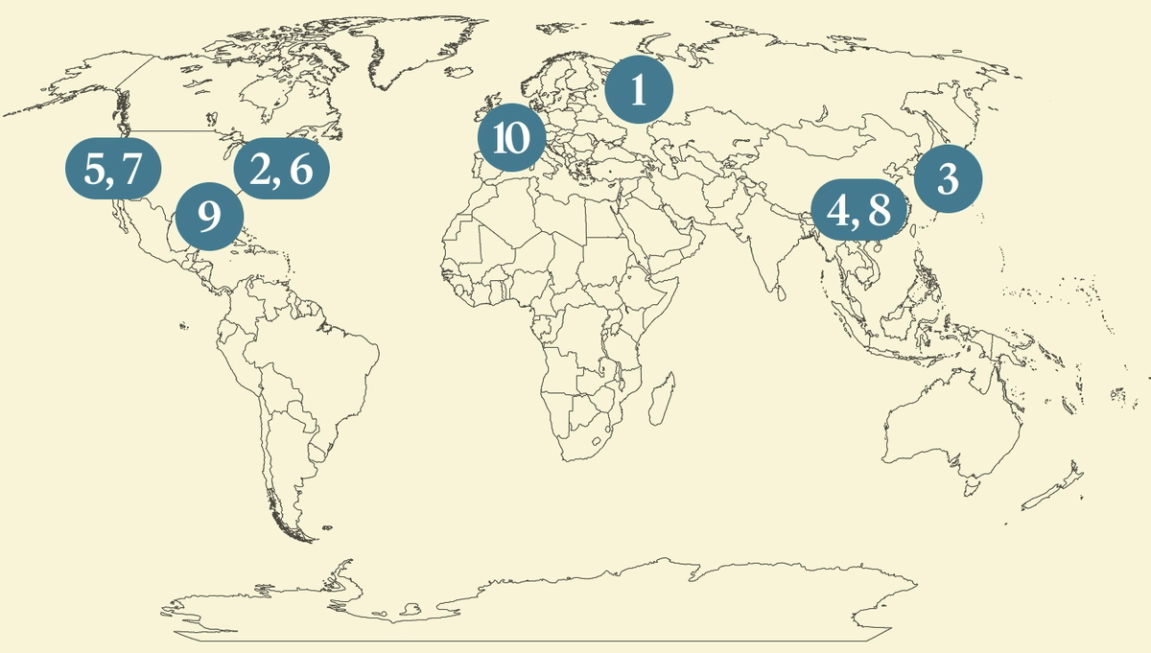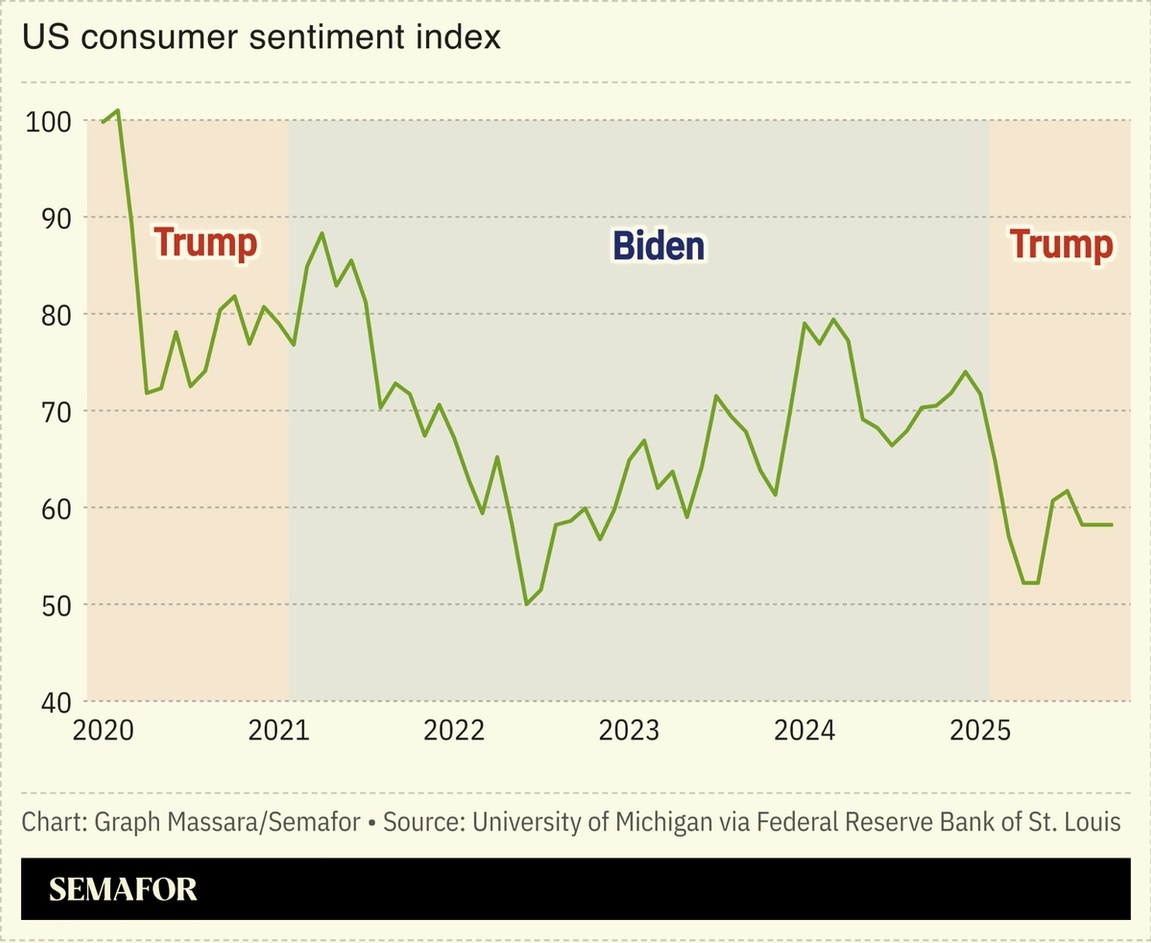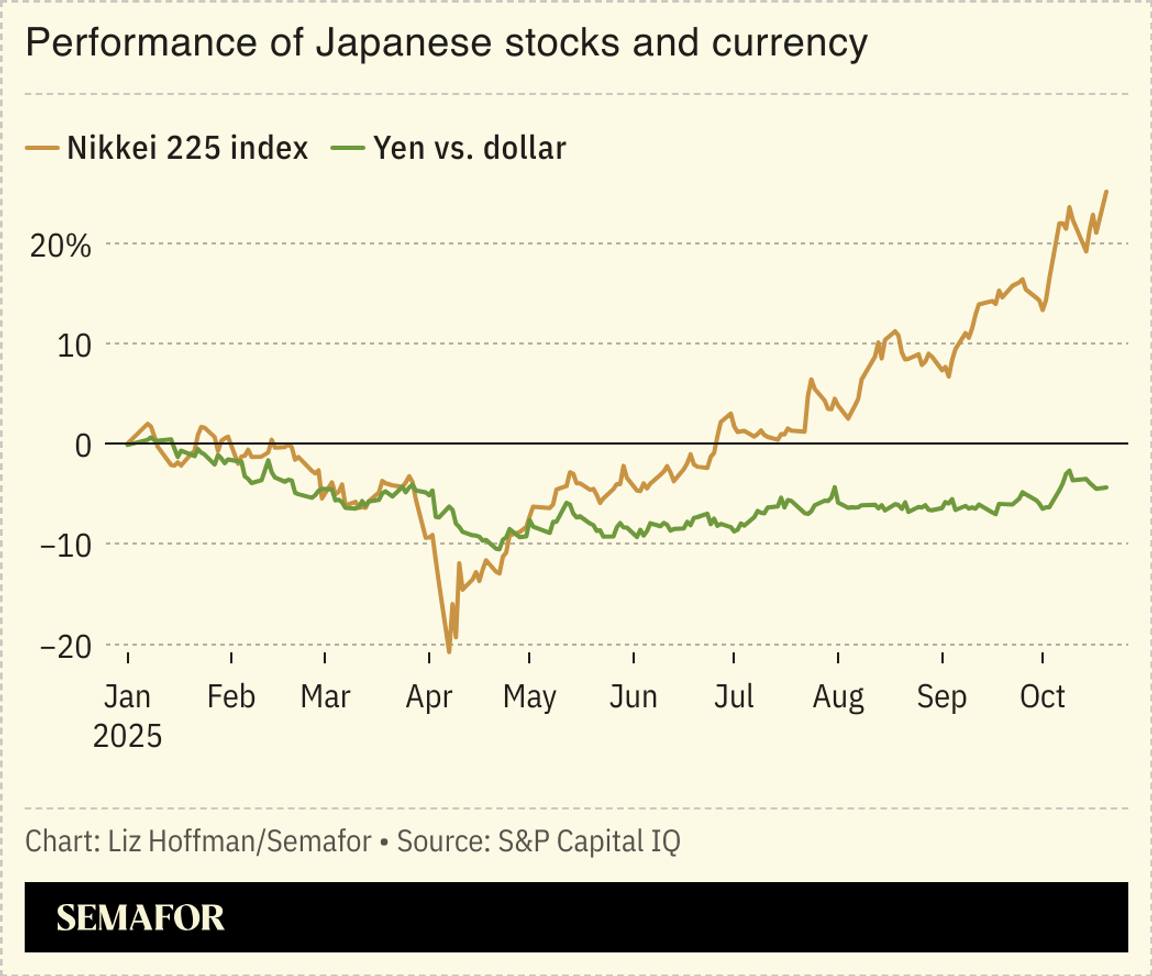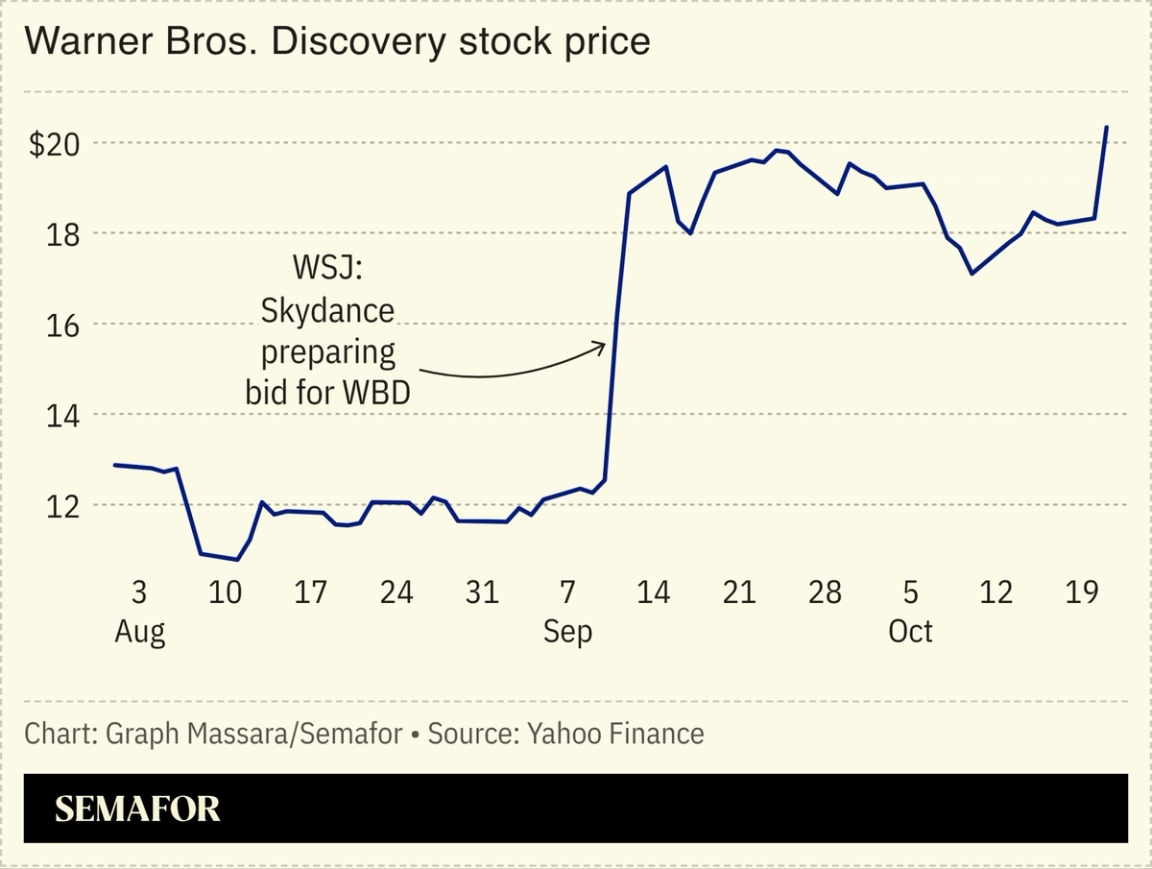| | Donald Trump no longer plans to meet Vladimir Putin in Budapest, OpenAI unveils a ChatGPT-powered we͏ ͏ ͏ ͏ ͏ ͏ |
| |  | Flagship |  |
| |
|
The World Today |  - No Trump-Putin summit
- US CEOs are optimistic
- Markets cheer new Japan PM
- Asian investors warm to China
- WBD is open to sale
- Cost of AWS outage
- OpenAI’s new browser
- China drives battery growth
- mRNA vaccine’s cancer hopes
- Race to find Louvre gems
 A sprawling retrospective for a reclusive artist, and Semafor’s editor-in-chief on how to win the information war. |
|
Trump-Putin Budapest meet shelved |
 Alexander Kazakov/Sputnik/Pool via Reuters Alexander Kazakov/Sputnik/Pool via ReutersUS President Donald Trump no longer plans to meet Russia’s Vladimir Putin in Budapest, the White House said Tuesday. The swift cancellation of the in-person summit, just days after Trump floated it, reportedly stemmed from Moscow’s refusal to water down its maximalist demands, including that Kyiv give up swaths of territory. The Kremlin is eager for a broader diplomatic deal that re-establishes its international heft to justify its role in global institutions like the UN, the Center for European Policy Analysis wrote. Ukraine and its European allies, meanwhile, are preparing a peace plan that would end the war based on the current frontlines — an idea that Trump appeared to endorse on Monday. |
|
US companies upbeat on economy |
 US corporations appear optimistic about the country’s economy, marking a turnaround from CEOs’ post-“Liberation Day” warnings. In this week’s slew of earnings reports, companies ranging from automakers (General Motors) to defense firms (Northrop Grumman) to consumer giants (Phillip Morris) raised their profit outlooks. The disclosures offer investors critical signals about the US’ economic health in the absence of government data during the federal shutdown. And thanks to a “resilient customer base,” spending is also likely to hold up during the upcoming Western holiday season, Walmart US’ CEO told Semafor last week. The upbeat reports have sent stocks to record highs, though analysts are watching whether the ongoing shutdown and Big Tech earnings next week could cool that momentum. |
|
New Japan PM boosts markets |
 Japanese stocks climbed on Tuesday after lawmakers elected a new prime minister, with foreign investors betting on Sanae Takaichi’s reflationist ambitions. A hardline conservative, Takaichi is expected to push for higher spending, tax cuts, and lower interest rates, in line with the philosophy of her mentor, the late Shinzo Abe. Foreign investors now see Japan as a way to diversify from Europe and the US, overcoming “the ‘lost decades’ of Japanese stocks,” one analyst said. While markets are cheering “Sanaenomics,” political realities could hinder Takaichi’s spending agenda: Her coalition with a party that favors a smaller government could mean more targeted industry-focused spending, instead of a massive stimulus, ING analysts wrote. |
|
Wealthy investors warm to China |
 Go Nakamura/Reuters Go Nakamura/ReutersUltrawealthy Asian investors are warming back up to China as the country’s stocks boom and the impact of US tariffs comes into clearer view. The past two years have seen more foreign financiers pull out of China as its economy worsened, but their “confidence and risk appetite have steadily recovered,” an HSBC strategist told Nikkei. A rally in Chinese equities has also lured more capital: One wealth manager said the swelling valuations of US tech stocks have made their cheaper Chinese counterparts more attractive. Other sectors of China’s economy, though, still weigh on foreign investors. Many are stuck with massive properties they can’t sell amid a real estate crisis, Bloomberg wrote, and are trying to offload them at steep losses. |
|
Media giant WBD up for sale |
 Media giant Warner Bros. Discovery put itself up for sale on Tuesday, setting up a free-for-all among rival programmers, studios, and tech firms. The company, which owns HBO, CNN, and other streaming and studio businesses, said it has registered interest from “multiple parties,” including Comcast and Paramount, sources told Semafor. The media industry has seen a remarkable amount of consolidation in recent years, with a handful of conglomerates controlling most of the major platforms. “Bigger is better might be good for shareholders,” one analyst said, but consumers could be hurt by a lack of choices. |
|
AWS outage cost economy billions |
 Benoit Tessier/Reuters Benoit Tessier/ReutersMonday’s Amazon Web Services outage may have cost the global economy hundreds of billions of dollars, an analyst estimated. Flights were delayed, millions of businesses stopped operating, and some banking services halted. E-commerce platforms — including Amazon’s own — were unable to make sales. Just three cloud-computing firms, AWS, Microsoft Azure, and Google Cloud, account for 60% of the market, leaving large chunks of the internet vulnerable if one collapses. The CEO of an analytics firm told CNN: “The incident highlights the complexity and fragility of the internet, as well as how much every aspect of our work depends on the internet.” Security experts told Forbes that “distributing critical workloads across two or more major providers” would mitigate some future risk. |
|
OpenAI enters AI browser wars |
 Dado Ruvic/Illustration/Reuters Dado Ruvic/Illustration/ReutersOpenAI on Tuesday unveiled a web browser powered by its chatbot, upping the stakes in the startup’s competition with Google. The release of ChatGPT Atlas builds on OpenAI’s efforts to bring more “agentic” AI to users, through bots that can accomplish tasks on your behalf. The AI browser wars are heating up: Search-based AI startup Perplexity rolled out its Comet assistant this summer, and Google is adding more AI features to Chrome. For OpenAI, the new venture underscores its ever-widening ambitions. The company has been on a dealmaking spree with some of the biggest tech players this year, “essentially making it too big to fail,” The Wall Street Journal wrote. |
|
 Join over 2 million readers who trust The Hustle for their daily 5-minute read on business and tech stories that actually matter. Become part of this informed community that starts each day with essential insights delivered with a fun, engaging twist. Sign up today. |
|
China drives growth in energy storage |
 Mike Blake/Reuters Mike Blake/ReutersChina is driving global battery growth, and is forecast to hold 43% of the world’s total energy capacity by 2035. Electricity storage is expanding to manage the increase in renewable energy, which produces electricity cheaply but intermittently and must be smoothed out. BloombergNEF forecasts strong growth worldwide, with capacity expected to grow twelvefold in the next decade, but — as with renewables themselves — China is expected to lead the way, thanks to political backing and market reforms. Without batteries, Works in Progress noted, renewable-led systems are reliant on ancillary power from other sources, usually gas, to prevent outages. Batteries rapidly reduce the cost of such services, with ancillary power prices in Texas and California dropping by two-thirds as storage capacity rose. |
|
COVID vaccine could boost cancer survival |
 Hannah Beier/Reuters Hannah Beier/ReutersmRNA vaccines for COVID-19 may boost the effectiveness of immunotherapy treatments for cancer. An analysis of patients being treated for advanced skin and lung cancers found that those vaccinated within 100 days of starting a particular therapy lived, on average, 37 months, compared to 20 months for those not vaccinated. Immunotherapy works by giving the immune system permission to attack cancer cells, which often hide themselves from our defenses: mRNA vaccines also work by triggering the immune system, and may stimulate a stronger response to the cancer. The results offer the potential of creating “a master key in the form of an mRNA vaccine” to help our bodies fight cancer, one researcher told New Scientist. |
|
Race to keep Louvre gems off black market |
 Benoit Tessier/Reuters Benoit Tessier/ReutersFrench authorities on Tuesday estimated the crown jewels stolen from the Louvre Museum are valued at $102 million, as investigators raced to keep the loot off the black market. Sunday’s brazen heist may do “irreparable” damage to the French art community, given that the items stolen carry a “much greater symbolic value” than those taken in previous museum robberies, a historian told Le Monde. Authorities fear the pieces could be |
|
|